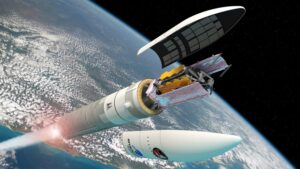JWST passes launch review
By Jeff Foust

WASHINGTON — The James Webb Space Telescope is one step closer to launch after a review of its Ariane launch vehicle, while NASA continues a separate review of the name of the spacecraft itself.
The European Space Agency announced July 1 that it, along with Arianespace, had successfully completed the final mission analysis review for the launch of JWST on an Ariane 5. “All technical evaluations performed by Arianespace on the mission’s key aspects, including the launch trajectory and payload separation, have shown positive results,” ESA said in a statement.
The Ariane 5 that will launch JWST has few changes from the version used for other missions, such as launches of commercial communications satellites. Maurice Te Plate, ESA JWST systems engineer, said at a June 28 session of the annual meeting of the European Astronomical Society that there will be some modifications to the payload fairing, including acoustic protection to lower loads on the satellite during launch and a separation system for the fairing with a low shock load.
The modifications for JWST are largely limited to the fairing. “The rest of the rocket is not so much different from other Arianes,” he said.
Problems with the payload fairing separation system on two Ariane 5 launches last year have effectively grounded the rocket since its last launch in August 2020. Arianespace announced July 1, after a Soyuz launch of OneWeb satellites, that the next Ariane 5 launch is scheduled for July 27.
That upcoming launch, of two commercial satellites, is the first of two Ariane 5 missions before the launch of JWST. While both NASA and ESA are maintaining a formal “launch readiness date” of Oct. 31 for JWST, the schedule of upcoming launches suggests JWST will launch no earlier than the second half of November.
Speaking at a June 30 “meeting of experts” held in place of a formal meeting of NASA’s Astrophysics Advisory Committee, Eric Smith, program scientist for JWST at NASA, declined to give a specific launch date for JWST. “Historically, they have taken about 60 days between launches,” he said. “But we need to wait until the launch provider says this is the current schedule.”
Reviewing JWST’s name
Work on the spacecraft itself is going well, Smith said, as workers prepare to ship it to French Guiana for launch processing. “Things look very good for completing all the work by August to have it ready for shipment,” he said.
One open item has nothing to do with the spacecraft itself, but rather its name. NASA renamed what was originally known as the Next Generation Space Telescope in 2002 after James Webb, who was NASA administrator from 1961 and 1968 and is credited for guiding the agency through the development of the Apollo program while also supporting science missions.
That choice has come under scrutiny in recent years given allegations that Webb, while at NASA and, earlier, the State Department, supported discrimination against LGBTQ people. That includes one case, cited in a recent online petition that has garnered more than 1,200 signatures, of the arrest, interrogation and firing of a NASA employee for being homosexual in 1963, when Webb was administrator.
NASA historians are conducting a review of historical records about Webb and his role in such events, but neither Smith nor Paul Hertz, director of NASA’s astrophysics division, offered many details about the progress of that review at the meeting of experts.
“I wish I could give you a timeline,” Smith said when asked when the review would be completed. Limited access to some historical archives because of closures linked to the pandemic has reportedly slowed that assessment. “I wish I could give you more, but I’ve shared all that I can really share at this point.”
Hertz said at the meeting June 29 that a decision whether to rename JWST would be made “at the highest levels of the agency” given the mission’s high profile. “When we make that decision, we must be transparent with the community and the public about our rationale.”
He added that there was no specific timeline for that decision but suggested it might take some time given the changeover in agency leadership. “There are a lot of people who are new to this discussion, so it might be soon, but it might be not quite as soon.”
July 6, 2021 at 04:56PM
via SpaceNews read more...

Post a Comment